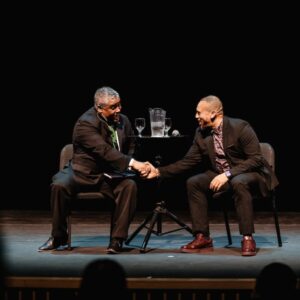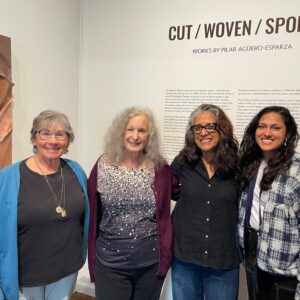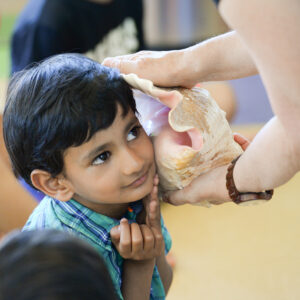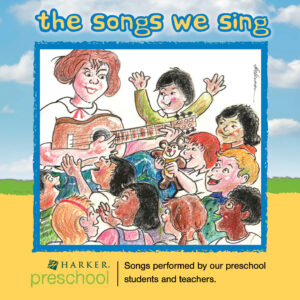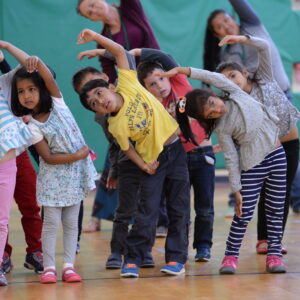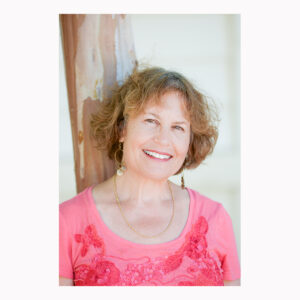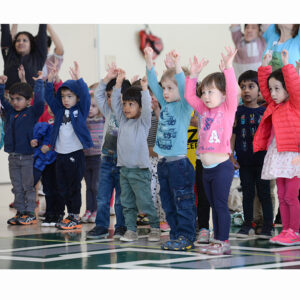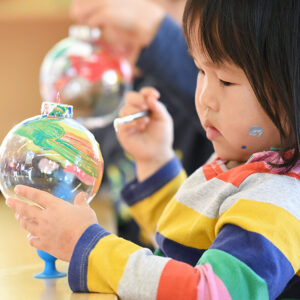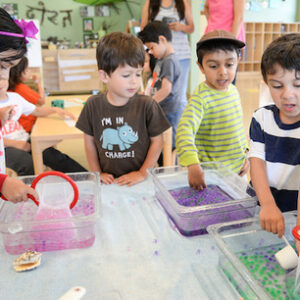This article originally appeared in the summer 2014 Harker Quarterly.
On a bright Wednesday morning in May, a group of 3 year olds from the Acorn Cottage gathered excitedly in Harker Preschool’s music room. Their teacher, Mara Beckerman (aka Ms. Mara) welcomed them to this, her first class of the day.
After the youngsters took their seats on brightly colored mats arranged in a circle, Beckerman said, “Listen closely and tell me what you think you hear!” Then she hid behind a desk and used a musical instrument to produce an odd noise, which the children said sounded like water or rain.
Coming out from behind the desk, Beckerman showed the children where the sound was coming from: an instrument, made from a cactus plant, called a rainstick. Partially filled with small pebbles, beans and nails, the stick is believed to have been invented by the Aztecs in the hope that playing it would bring about rainstorms.
The rainstick is just one of many unique instruments the preschoolers were introduced to in music class. Each week, Harker preschoolers of all ages attend interactive music and movement specialty classes, taught by Beckerman, who for the past 25 years has worked with pre-K to adults and children with special needs, in both private and public schools.
Following the rainstick exercise, the children went off to make their very own musical instrument called a shaker egg. Each child was given various materials, including very fine yellow fish tank gravel, medium size black lentil beans and larger red fish tank gravel. Each created a different sound. The children, having been sensitized to “listening,” experimented to create a unique shaker by choosing a combination of the three materials.
Beckerman explained that a shaker egg is a modern hand percussion instrument from Latin America that makes a rhythmic sound when shaken. It is similar to a maraca without a handle. When she told the children they got to take the eggs home, to keep and show their parents, delighted shouts of “yay!” filled the classroom.
Student Ishaan Dhillon-Patel said he had never made a shaker egg before. “Mine is going to be the weirdest of all!” he said with a huge grin as he carefully filled his egg with the tiny pebbles.
Sitting across from him, classmate Omya Vidyarthi proudly held up her purple egg, noting that purple is her favorite color. “Mine is so loud!” she exclaimed, giving it a shake.
Satisfied with their egg creations, both Dhillon-Patel and Vidyarthi returned to their mats and sang songs with their peers while tapping their shakers from one knee to the other, keeping a steady beat with the music. Beckerman explained that “this simple movement of crossing the midline of one’s body is so important for a child to develop.”
After the Acorn Cottage students ended their music and movement session, Beckerman quickly rearranged the room to welcome her next class, the transitional kindergarten (TK) group. “It’s time for music. It’s time to sing along!” sang Beckerman while playing the guitar as they settled into their spots on the floor.
Beckerman introduced a new song, called “Sobonana Kusasa,” which was an especially big hit. “The words are from the Zulu people in South Africa meaning ‘goodbye till we meet again,’” she said, noting that the children really enjoy learning songs in different languages.
TK student Zachary Davidson said he liked the song. “It made me feel quiet,” he said.
“The new ‘Sobonana Kusasa’ song was nice because I felt calm and sleepy,” added Vera Sorotokin.
Meanwhile, classmate Rishi Kutty’s favorite song was “Hey Dum Diddley Dum.”
“I sing it at home ’cause I love it so much,” he said.
For William Wu, the best part about music class was the movement aspect. “I liked the running, galloping and jumping movements, holding hands and swaying,” he reported.
“These may seem like simple movements, but children of this age are still learning to move their bodies,” said Beckerman.
In addition to singing and having fun moving around, the TK students took turns playing a range of musical instruments set up at various stations. Together they made a beautiful orchestra of sounds using xylophones, temple blocks with mallets and wooden frog guiros (an instrument with a serrated surface that produces sound when it is scraped).
Back in February it rained and preschool classes of all ages learned about worms. Students got to look and hold them, as well as sing songs and get on the floor and do a worm dance. During the same month, Beckerman helped organize a successful schoolwide Chinese New Year parade. The children learned the traditional song “Guong Xi” with new lyrics (by Beckerman) that told the traditional story of the Chinese New Year and the monster Nian. During the parade, the students played instruments and wore homemade masks, as well as traditional lion and dragon costumes loaned by a Harker parent.
Most recently, the music and movement specialty class, along with Harker’s middle school, hosted the inaugural “Music LIVE for Three to FIVE!,” at which the preschool welcomed the middle school’s chamber ensembles. Under the tutelage of David Hart, the show was led by student performers playing instruments such as the French horn, tuba, alto saxophone, guitar, bass guitar, flute, violin and harp.
With the belief that physical development is as important to the young child as any other area of learning, Beckerman uses music and movement experiences to help children gain strength, coordination, agility and a positive relationship with their bodies. “Through dance, games, songs, rolling, sliding, jumping, marching and more, they enjoy and appreciate movement in many forms,” she said.
An Off-Broadway actor for many years, Beckerman transitioned from musicals to her own one-woman show as a storyteller/ musician, traveling the country and conducting workshops in acting and storytelling. For the past 10 years, her focus has been on music and movement for pre-kindergarten through elementary grades.
“I feel like I am where I always really wanted to be – a teacher,” said Beckerman, adding that through teaching comes the ability to help make the world a better place.
The music and movement class is one of three specialty classes offered at Harker Preschool. The others are the STEM lab and art studio. According to Andrea Hart, director of Harker Preschool, all of the specialty classes are broken up by ages.
The specialty classes are rich with activities and educational materials in each particular subject area, which offer a balance between child-directed exploratory learning and teacher-directed activities. But, said Hart, the specialists make these classes meaningful for each child.
“Mara is a great example of an early childhood professional who is an expert in her subject and has a passion for teaching young children. You can see this every day in her classes; she is deeply interested in knowing and guiding each individual child,” Hart said.
Look for further articles on specialty classes at Harker Preschool in future issues of Harker Quarterly.



